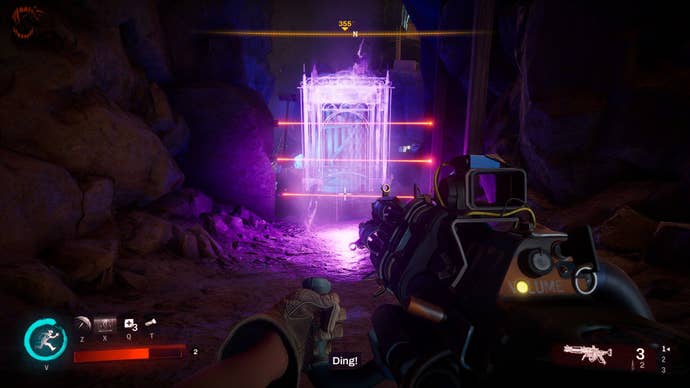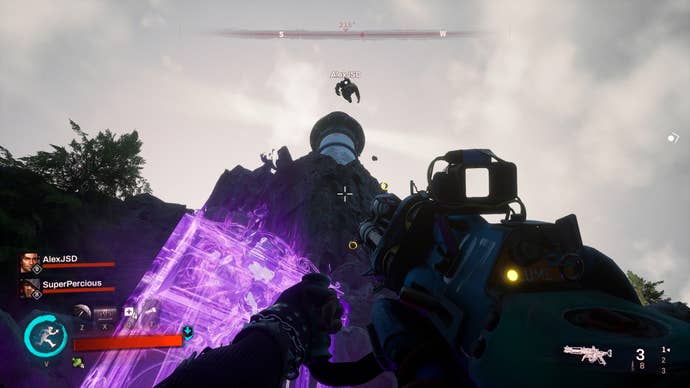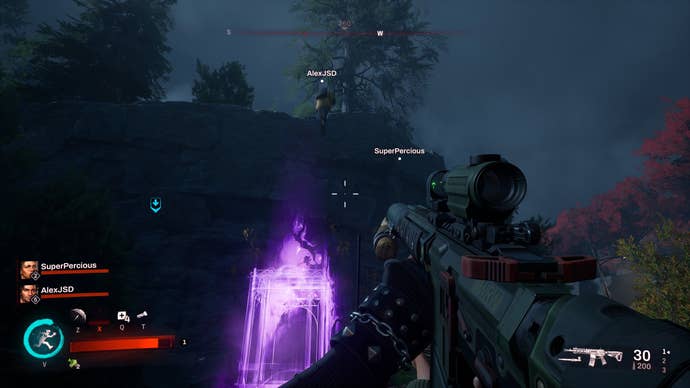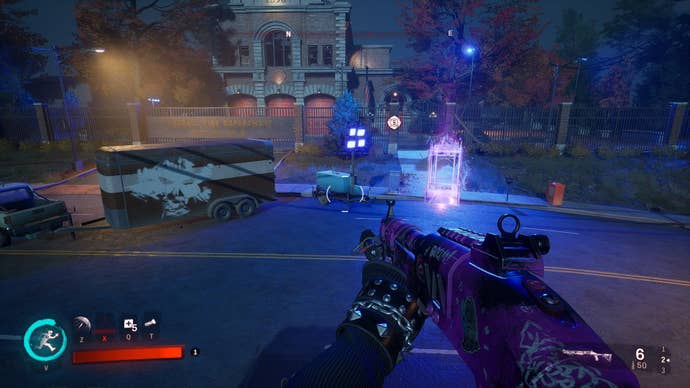Products You May Like
Layla’s blood is type O negative, which is how you know her goth phase is never going to end. And given that knowledge, it’s no surprise her telekinetic powers should manifest the way they do. Her personal shield is an umbrella of the kind Jenna Ortega carries in posters for Addams Family reboot Wednesday. And her traversal skill is a spooky, spectral elevator – the type you might take to visit David S Pumpkins, or Leo’s dead wife in Inception. Then there’s the vampire ex-boyfriend: both Layla’s ultimate ability and the ultimate tribute to Twilight.
It’s the trademark ‘ding!’ of the elevator that’s stuck in my head, though, even after finishing my Redfall review and finding Arkane’s latest FPS wanting. Layla’s lift is a leftfield, bizarre and truly memorable way to get around.
It works thus: at any time, cooldown permitting, Layla can pick a flat surface at short-to-midrange and summon a translucent, pink-purple rectangle that is, unmistakably, an elevator. It’s got one of those Bostwick gates you see in creepy old hotels, with the metal lattice that slides across to let you in or out. Not that Layla uses the door: this being a ghostly elevator, she walks straight through the shimmering membrane and is fired, suddenly, high into the air.
Once this happens, you realise two things. First, that your arc is slow and malleable, allowing you to steer and course correct somewhat in midair. And second, that fall damage is temporarily disabled after a lift, letting you drop great distances without harm. It’s a setup that makes learning and experimentation fun, rather than punishing.
Still, it’s an odd trick. On the one hand, Redfall is a town built by the makers of Dishonored, and so gives you a decent amount of vertical space to explore: rooftops to wander, and upstairs windows to clamber through. On the other, it’s an open world, and objectives are spaced out across its New England expanse. There are no vehicles, and the elevator doesn’t really help reduce that distance. In terms of trajectory, it’s more like artillery fire than a bullet from a gun, offering no horizontal speed advantage whatsoever.
In Redfall’s opening hours, I longed for one of Far Cry’s gliders – a way to punt myself from the front door of my hillside hub into the seaside suburbia down below. But, as I stuffed points into the lift’s upgrade tree, that pang gradually subsided, and I became grateful for the fact that Arkane had forced me to embrace the old-timey bouncepad in my back pocket.
In some ways, it’s an evolution of the traversal powers Arkane has been working on for a decade. In 2012’s Dishonored, the developer introduced Blink, a game-changing magical teleport that enabled you to close gaps and find farflung routes in the rafters of its levels. Blinking was flexible yet reliable, matching your intent and depositing you exactly where you expected every time.

Dishonored 2’s twist was Far Reach, a supernatural gift from the Outsider to protagonist and princess Emily Kaldwin. It allowed her to reach distant points by latching onto them with a tendril – a grappling hook from the Void – and firing herself through the air. So far, so Blink. Only unlike its predecessor, Far Reach was bound by physical laws like inertia. If you leapt from the ground to the rafters, momentum could carry you higher still, creating new potential for both fuck-ups and skill-based mastery.
Layla’s elevator is even stranger to get to grips with, and becomes more useful over time. For instance: I soon learned that a second bounce off the lift’s roof could take me slightly higher than the first – and so, like a trampolinist preparing for a somersault, I would wait to get that extra height. After that, pressing the mantle key at just the right time to grab the gutter of a nearby roof became like breathing. And with practice, I was able to crouch-slide and summon an elevator in the same sequence of movements, keeping up momentum while escaping enemy fire. Just as importantly, I looked cool while doing it.
Even getting across the map eventually became easier, as I funnelled every single skill point over 15 hours into that old-ass elevator. At higher levels, you can summon three lifts in quick succession, enabling you to soar from one to the next in Mario-esque bounds. Planting a second elevator beneath you as you hurtle towards the earth isn’t straightforward, exactly, but that only makes a lift combo more satisfying – especially when it carries you and your teammates clear of Redfall’s dry river beds and damaging red mists.

Co-op adds to the thrill in a couple of meaningful ways. Firstly, it gives you an audience, one which most likely cannot do the things you do, and is audibly appreciative when you create a new path for them through Redfall’s craggy terrain. And second, it lets you combine your abilities. Other characters in Redfall have traversal tools too: Remi’s C4 can boost you to higher ground; Devinder’s translocator is basically a teleportation grenade. Working together to grasp an out-of-reach ledge is the most rewarding teamwork available in the whole game.

Yet there’s unlikely stealth potential to the elevator, too, best discovered while playing alone. One side mission asked me to break into the house of a survivor, Bill, and retrieve a radio recording for broadcast. The place was rigged with triplasers and coated with petrol, ready to go up in flames should I wiggle a toe in the wrong spot. Rather than spend all of my rewire tools disabling the traps, I judiciously deployed the lift in a few key places – firing myself toward the ceiling and steering carefully around the glowing orange beams. Once safely in Bill’s bedroom, I fired on the cultists loitering in the street, letting them stumble through the explosives downstairs in a gleeful, Dishonored-esque payoff.
Perhaps the elevator can carry us to a higher way of thinking. In recent years, the FPS has been transformed by traversal mechanics – dynamic movement that has bled from Titanfall and Doom into Warzone, Deathloop, and Apex. The genre is much improved for it. But as mantling and sliding is standardised, developers shouldn’t be afraid to push further into weird, one-off abilities like Layla’s: the sort of chewy, unique skills that can keep you learning and engaged for hours on end. How should I put it? The only way is up.
